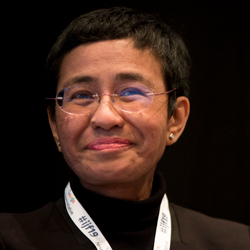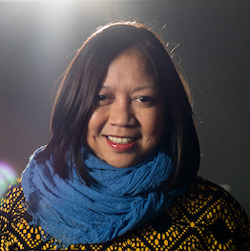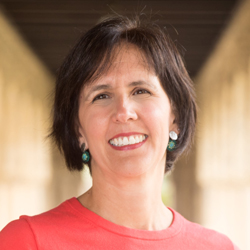About the Event
When journalists become a target for intimidation, harassment, and persecution by political leaders, the search for truth and context in reporting and documenting that reporting becomes more vital than ever.
Director Ramona Diaz engages in a digital conversation with Maria Ressa, the Filipina journalist and founder of Rappler, whose story is chronicled in Ramona’s A Thousand Cuts. The film lays bare a government regime in the Philippines oppressive to freedom of the press and a journalist determined to hold those in power accountable. The result is a portrait of the risks, rewards, and danger of choosing truth in a hostile environment and a harbinger of threats to the work of all storytellers across the globe. This essential documentary journalism conversation will be moderated by Marina Walker Guevara of the Pulitzer Center.
Event Participants
 Maria Ressa
Maria Ressa
A journalist in Asia for nearly 35 years, Maria Ressa co-founded Rappler, the top digital only news site that is leading the fight for press freedom in the Philippines. As Rappler's executive editor and CEO, Maria has endured constant political harassment and arrests by the Duterte government, forced to post bail eight times to stay free. Rappler's battle for truth and democracy is the subject of the 2020 Sundance Film Festival documentary A THOUSAND CUTS. For her courage and work on disinformation and 'fake news,' Maria was named Time Magazine’s 2018 Person of the Year, was among its 100 Most Influential People of 2019, and has also been named one of Time's Most Influential Women of the Century. She was also part of BBC's 100 most inspiring and influential women of 2019 and Prospect magazine's world's top 50 thinkers. Before founding Rappler, Maria focused on investigating terrorism in Southeast Asia. She opened and ran CNN's Manila Bureau for nearly a decade before opening the network's Jakarta Bureau, which she ran from 1995 to 2005. She wrote Seeds of Terror: An Eyewitness Account of al-Qaeda’s Newest Center of Operations in Southeast Asia and From Bin Laden to Facebook: 10 Days of Abduction, 10 Years of Terrorism.Maria studied molecular biology and theater at Princeton University. She then applied for a Fulbright Fellowship, with which she completed her Masters in Journalism at the University of the Philippines Diliman.
 Ramona S. Diaz
Ramona S. Diaz
Ramona S. Diaz is an award-winning Asian American filmmaker whose films have screened at Sundance, the Berlinale, Tribeca, the Viennale, IDFA, and many other top-tier film festivals. All of Ramona's feature-length films—Imelda (2004), The Learning (2011), Don’t Stop Believin’: Everyman’s Journey (2012) and her latest film, Motherland (2017)—have been broadcast on PBS, on either the POV or Independent Lens series. Motherland won an award at the 2017 Sundance Film Festival and had its international premiere at the 67th Berlin International Film Festival. It was nominated for an Independent Spirit Award for Best Documentary, a Peabody Award, and a Gaward Urian Award from the Filipino Film Critics. She is a current recipient of a United States Artist Fellowship. Ramona is a graduate of Emerson College and holds an MA from Stanford University.
 Marina Walker Guevara, Moderator
Marina Walker Guevara, Moderator
Marina Walker Guevara is the executive editor at the Pulitzer Center, an organization that supports ambitious, innovative reporting on underreported issues. Before, Walker Guevara worked at the International Consortium of Investigative Journalists (ICIJ) where she managed the two largest collaborations of reporters in journalism history: The Panama Papers and the Paradise Papers. Walker Guevara was instrumental in developing a model of large-scale media collaboration, persuading reporters who used to compete with one another instead to work together, share resources and amplify their reach and impact. She has won or shared more than 50 national and international awards, including the 2017 Pulitzer Prize for Explanatory Reporting. In 2018-2019, Walker Guevara was a John S. Knight fellow at Stanford University where she focused on the use of artificial intelligence in big data journalistic investigations.